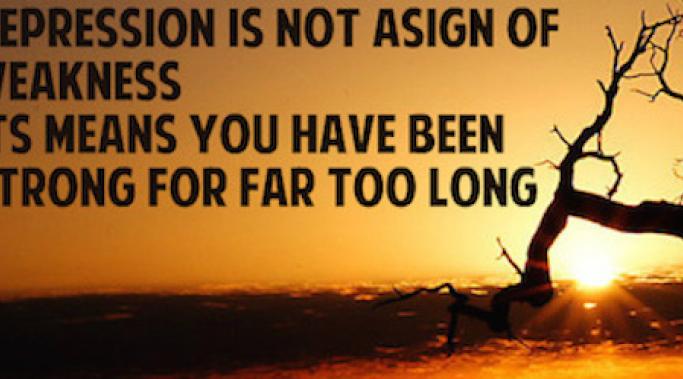Blogs
Sometimes it feels like romanticization of mental illness is everywhere these days and this feeds mental health stigma. Whether it’s some trendy post about what mental health “is” or how people with mental health illnesses “actually” are, it’s pretty likely to be somewhere in the social media sphere. One of the ones that bothers me the most is the one about “being strong for too long.” I’ll elaborate on how it romanticizes mental illness and feeds mental health stigma.
It's common to experience anxiety over a loved one's health. Whether someone lives with an anxiety disorder or if anxiety isn't normally bothersome, when a loved one is facing health problems, most people experience some degree of worry and fear about whether a loved one will be okay. When facing anxiety over a loved one's health, there are some dos and don'ts to help guide you and ease anxiety.
Planning ahead for mental illness during the holiday season is tough, but it is doable. I could almost feel the whisper of hypomania pulsing through my veins last weekend as my family and I rolled through the Starbucks drive-thru. I squealed with excitement as the green aprons passed me my steaming red cup. As I sipped my cup of eggnog and espresso, I couldn't help but hope that my usual upswing was on its way. I look forward to my Christmas high--to actually feeling good--all year long. Christmas is so much fun. But is hypomania really a good thing for my family (Effects Of Bipolar On Family And Friends)? How can I navigate through my bipolar disorder to have a magical and peaceful holiday season? How can I plan ahead for my mental illness during the holidays?
I was thinking about adrenaline rushes and bipolar disorder the other day after I got to hang off the side of the CN Tower, the tallest, freestanding structure in the Western Hemisphere. Taking the Edge Walk, as they call it, around the outside of the building, 1168 feet in the air, led to a huge adrenaline rush (Bipolar Treatment and Risk Tolerance). So what is the effect of an adrenaline rush on bipolar disorder?
Most of us need some holiday stress reduction tips at this time of the year. Let’s face it—the holidays are full of stress. If you have a mental illness the stress typically just intensifies so try to maintain your bliss with these holiday stress reduction tips.
Creativity can help you to build self-esteem, improve your mental health and boost your wellbeing. There are many ways that you can be creative and it doesn’t matter what you do. For example, it can be anything from writing, art, design, playing music, cooking, scrapbooking, pottery, cake decorating, knitting, sewing, woodworking, photography, gardening or dancing. Here are some reasons why it’s worth trying creativity to build self-esteem.
How does one go about finding safe people for mental illness recovery? Recently I wrote about developing a safe place for mental illness recovery. A safe place is enhanced by safe people, either real or fictional. Safe people are vital to recovery from trauma and in therapy. So here are three safe people one should find for mental illness recovery.
A mental illness relapse tricked me into thinking I was a fraud. As the author of the blog entitled Getting Through Tough Times, I am required -- by the very delineation of the phrase -- to speak about my own tough times. It’s my job to share obstacles I have overcome and urge other people to do the same (Mental Health 101: Developing Coping Strategies). But recently I’ve felt like a fake, a fraud. I’ve sat in front of a computer screen with my fingers poised above the keys, ready to type a stream of words that sound fancy and wise, and I’ve stood in front of a camera with a bunch of rehearsed clichés, prepared to spout them out robotically.
But I could never go through with it because I was struggling with my own form of mental illness relapse. And for those with a history of mental illness, that is what struggling so frequently means (Anatomy Of A Mental Illness Relapse).
Using mindfulness in posttraumatic stress disorder (PTSD) recovery can be a lifesaver. One of the most difficult things about having PTSD is dealing with the PTSD symptoms -- but mindfulness can help, even when triggered. There are a number of things that I know will trigger me, and I do my best to avoid those triggers. Some things sneak up on me, though, and I have to deal with the anxiety and fear that is caused by the fight or flight response my body has. One of the most effective ways I have found to get through those types of situations is by using mindfulness in my PTSD recovery.
It can be hard to feel motivated and confident even on good days. Learn how to feel motivated with this DBT skill. It will get you feeling motivated and more confident fast.










I believe she will only be able to rid herself of her demons, and hopefully her BPD as well, when she's ready to confront the abuse of her father. If she can put the blame where it belongs, she may stop projecting that victim/perpetrator cycle on the present men in her life. These demons are a metaphor for the purgatory she has created for herself. That reality has consequences in the real world, but it need not be real in the tangible sense. Exorcising her demons will require the expenditure of real physical energy and probably the destruction of aspects of her personality. If this ever happens, and it's possible but not probable, then these demons will evaporate. They are only as real as one's personality is real. In short, reality is not the question, it's what you make of the things you feel to be real.